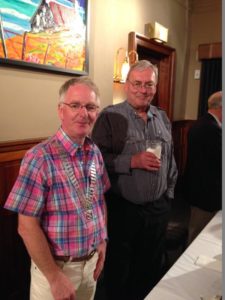Denis Rattenbury – Smuggling in Ayrshire – 15 August 2017
 Local historian and raconteur, Denis Rattenbury, gave the club an excellent discourse on various aspects of smuggling in Ayrshire in the 18th century. In his introduction Denis revealed his credentials for this topic in his Devonian ancestry citing, in particular, his great, great grandfather, Jack Rattenbury.
Local historian and raconteur, Denis Rattenbury, gave the club an excellent discourse on various aspects of smuggling in Ayrshire in the 18th century. In his introduction Denis revealed his credentials for this topic in his Devonian ancestry citing, in particular, his great, great grandfather, Jack Rattenbury.
Jack, nicknamed “Rob Roy of the West” had been a top smuggler in 18th century south-west England where he headed up a hugely successful smuggling gang. At one stage he was arrested for assisting escaped French prisoners but the magistrate admonished him whereupon he recommenced his life in smuggling, fishing and piloting, the last of these due to his excellent seamanship.
Moving on to his main topic of smuggling in Ayrshire, Denis explained that tax changes after the Act of the Union in 1707 encouraged a growth in smuggling activity and that the serrated coastline of south-west Scotland was ideal for this (although this had been the case long before 1707). Around this time the Dukes of Atholl (Lords of Man) had feudal rights over the Isle which for three centuries had been a private domain, outside of the control of the crown, Tax advantages had given rise to a robust smuggling trade between the Isle and south-west Scotland. This came to an end when the then Duke equalised tax duties, whereupon much of smuggling trade moved to the Channel Islands.
Denis identified the most popular goods which were smuggled and these included tea (frequently adulterated), claret (loved by Scots through all levels of society), whiskey (much of it illicit), silk and brandy. The revenue sailors were generally no match for the smugglers whose seamanship was without equal.
In describing the attractions of the Ayrshire coastline to smugglers, Denis highlighted Ballantrae as a particularly important location and alerted members to the growing popularity of the new Ballantrae Smugglers Festival which took place in June this year.
Smuggling in the late 18th century was a major element in the economic activity of the British Isles as shipping trade, legitimate and otherwise, continued to increase. Banks (many recently established) had invested heavily in shipbuilding and harbour works and corruption amongst the custom collectors and surveyors was widespread. Eventually, in 1772, came the financial crash which led to the collapse of the Ayr Bank, inter-alia. As an aside, Denis linked the death of Robert Burns’ father, William (who at that time leased Lochlea farm at Tarbolton and was in arrears), to the collapse of the Ayr Bank.
This was the Age of Enlightenment which had produced, in Scotland, some of the foremost thinkers in various, diverse, academic fields. These included Adam Smith whose Wealth of Nations is still viewed as one of the most important books in economic literature. Smuggling, which by that time had permeated all levels of society was gradually and effectively outlawed.
In his summing up Jimmy Begg thanked Denis for his amusing and interesting talk which had kept the audience enthralled.

